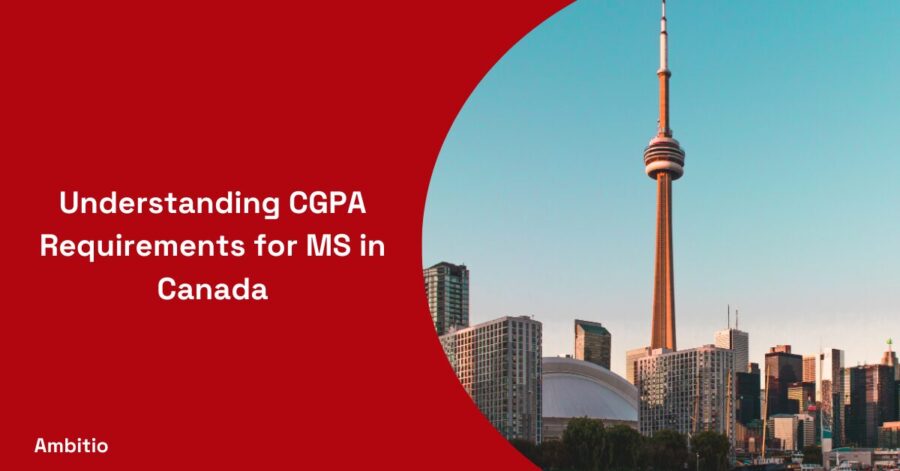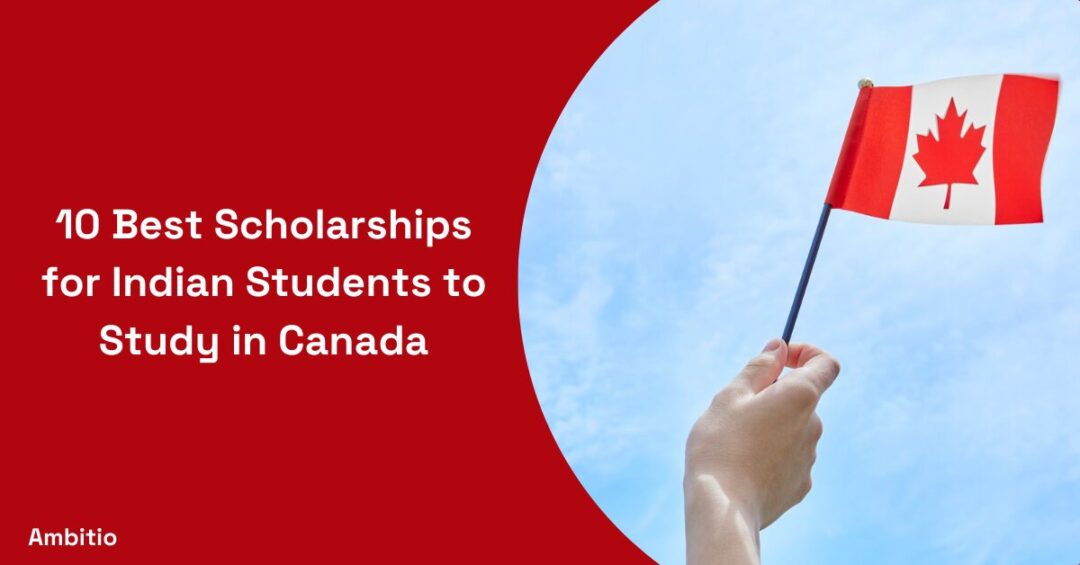13 December 2024
6 minutes read
Understanding CGPA Requirements for MS in Canada: A Comprehensive Guide for International Students

Introduction
Pursuing a Master’s degree in Canada is a coveted goal for many international students. The combination of a high standard of education, a diverse cultural atmosphere, and abundant career opportunities makes Canadian universities highly sought-after.
A crucial aspect for applicants is understanding the CGPA (Cumulative Grade Point Average) requirements for admission. This comprehensive guide aims to clarify the GPA and CGPA criteria for master programs in Canadian universities, particularly addressing concerns of students with a lower GPA.
We will delve into various facets of the admission process, providing you with a thorough understanding of what Canadian universities look for in prospective students.
CGPA Requirements for Masters in Canada
Decoding CGPA and GPA: The Basics for International Students
CGPA, or Cumulative Grade Point Average, is a key metric used by Canadian universities to assess the academic performance of applicants. It’s a numerical representation of a student’s grades, typically on a 4.0 scale, although some institutions may use different scales.
For most Canadian universities, the minimum CGPA for admission into Masters programs is generally around 3.0. However, this requirement varies depending on the university and the specific program.
It’s important for international students to understand how their grades convert to the Canadian grading system, which can sometimes differ significantly from their home country’s system.
Navigating Through Low CGPA: Strategies for Admission
Having a low CGPA is not necessarily a deal-breaker for aspiring Master’s students in Canada. Many Canadian universities take a holistic approach to admissions, considering other aspects of an applicant’s profile.
This includes work experience, research projects, extracurricular activities, and strong letters of recommendation. Enhancing these areas can significantly improve your chances of admission, even if your CGPA is below the typical requirement. Additionally, demonstrating significant improvements or excellence in your final years of undergraduate study can also help mitigate a lower overall CGPA.
Comprehensive List of Canadian Universities Accepting Low CGPA
There are several reputable Canadian universities known for their flexible approach towards CGPA requirements. Institutions such as the University of British Columbia, Simon Fraser University, and the University of Manitoba are among those that may accept students with a CGPA lower than 3.0.
These universities often look beyond the numbers to identify candidates who show promise through other achievements and capabilities. It’s crucial to research each university’s specific requirements and tailor your application to highlight your strengths accordingly.
Opportunities and Challenges for Low GPA Applicants in Canada
Scholarship Prospects for Students with Low GPA
Finding scholarships as a student with a low GPA might seem challenging, but there are still numerous opportunities available. Here are strategies and insights on how to navigate and secure scholarship funding:
- Seek Non-Academic Based Scholarships:
- Look for scholarships that focus on community service, leadership, or specific talents instead of academic performance.
- Explore awards based on criteria such as volunteer work, artistic abilities, or athletic achievements.
- Apply for Need-Based Scholarships:
- Research scholarships are awarded based on financial need.
- Prepare to provide documentation or evidence of your financial situation.
- Explore Scholarships Offered by Employers or Community Organizations:
- Check if your employer, or your parents’ employers, offers scholarships for employees or their dependents.
- Join community groups or clubs, as many offer scholarships to active members.
- Utilize Essay Competitions:
- Enter essay contests where scholarships are awarded for the best submissions.
- Leverage your writing skills to compensate for a lower GPA.
- Focus on Scholarships for Specific Demographics:
- Look for scholarships targeting specific groups you may belong to, such as women, minorities, or veterans.
- Research scholarships are tailored to students with unique backgrounds or life experiences.
- Consider Scholarships for Specific Fields of Study:
- If you’re pursuing a specialized field, search for scholarships specific to that discipline.
- Industry-specific scholarships often have different criteria than general academic scholarships.
- Leverage Your Personal Story and Experiences:
- Some scholarships are interested in your personal journey and resilience.
- Share compelling stories of overcoming obstacles, personal growth, and determination.
- Apply for Scholarships at Less Competitive Institutions:
- Smaller or less well-known universities may offer scholarships with less stringent GPA requirements.
- Research and consider schools that might not be as competitive but still offer quality education.
- Look into Scholarships from Religious or Cultural Organizations:
- Religious and cultural groups often offer scholarships to members of their community.
- Check with local organizations connected to your cultural or religious background.
- Keep an Eye on Local Scholarships:
- Local businesses and community groups may offer scholarships.
- These are often less competitive and may not prioritize GPA as heavily.
- Search for Work-Study Programs or Assistantships:
- Look for opportunities at universities that offer tuition waivers or stipends in exchange for work or research.
- These positions can sometimes offer substantial financial assistance.
- Stay Persistent and Keep Applying:
- Scholarship applications can be a numbers game. Apply for as many as you qualify for.
- Don’t get discouraged by rejections. Persistence is key.
Even with a low GPA, you can find numerous scholarships and financial aid opportunities. It’s important to broaden your search criteria, highlight your strengths outside of academics, and persistently apply to as many suitable scholarships as possible.
The Role of Standardized Tests in Balancing a Low GPA
For international students, standardized tests such as the GRE (Graduate Record Examinations) or the IELTS (International English Language Testing System) can play a significant role in the admissions process.
Performing well in these tests can complement your academic profile, especially if your CGPA is on the lower side. A high score in these exams demonstrates your readiness for graduate-level study and proficiency in essential skills, helping to balance out a lower GPA.
Leveraging Work Experience and Research to Offset a Low CGPA
Work experience and research accomplishments can significantly enhance your Master’s application in Canada, especially if your CGPA isn’t stellar. Relevant professional experience, internships, or notable research projects can demonstrate practical skills and a commitment to your field of study.
Highlighting these experiences in your application and letters of recommendation can provide a more comprehensive view of your capabilities, offsetting a lower academic score.
Strategies for Effective Application with a Low GPA
When applying to Canadian universities for a Master’s program with a low GPA, it’s important to adopt strategies that can help strengthen your application. Here are some effective tactics:
- Craft a Compelling Statement of Purpose (SOP):
- Clearly articulate your academic and career goals.
- Explain any extenuating circumstances that contributed to your low GPA.
- Highlight your passion and commitment to the field of study.
- Demonstrate how you have grown from past academic challenges.
- Showcase Relevant Work Experience:
- Include internships, part-time jobs, and full-time roles relevant to your field.
- Emphasize the skills and knowledge gained from these experiences.
- Highlight any significant achievements or contributions in your professional life.
- Focus on Recent Academic Successes:
- If your GPA improved over time, make sure to point this out.
- Include any post-graduate courses or certifications completed with good grades.
- Obtain Strong Letters of Recommendation:
- Choose recommenders who know you well and can vouch for your abilities.
- Ideally, include both academic and professional references.
- Ensure recommenders highlight your strengths, work ethic, and potential.
- Excel in Standardized Tests:
- Aim for high scores in GRE, GMAT, or other relevant tests.
- Use test scores to demonstrate your academic capabilities and readiness for graduate-level work.
- Demonstrate Research Skills or Academic Projects:
- Present any research work, publications, or significant academic projects.
- Highlight your role and contributions to these projects.
- Showcase Extracurricular Activities and Leadership Roles:
- Include involvement in clubs, organizations, volunteer work, and other activities.
- Emphasize leadership roles and initiatives you took part in.
- Highlight Personal Development and Soft Skills:
- Discuss how you’ve developed key soft skills like communication, teamwork, and problem-solving.
- Reflect on personal growth and how it has prepared you for graduate studies.
- Address the Low GPA Directly (If Applicable):
- Briefly explain the reasons for your low GPA in a positive and constructive manner.
- Focus on how you have overcome these challenges and learned from them.
- Tailor Your Application to Each University:
- Research each university’s values and program specifics.
- Align your application to reflect how you fit into their program and culture.
- Prepare a Strong Online Presence:
- Maintain a professional LinkedIn profile showcasing your achievements.
- If applicable, include a portfolio or personal website with your work.
- Be Honest and Authentic:
- Maintain integrity in your application; do not exaggerate or falsify information.
- Show your genuine interest and enthusiasm for the field of study.
By implementing these strategies, you can build a well-rounded application that compensates for a lower GPA and effectively showcases your potential as a graduate student.
Understanding the Canadian Educational Context
Adapting to the Canadian Grading System
The Canadian grading system can be quite different from those in other countries. Understanding how your academic achievements translate into this system is crucial for international students.
Many universities provide CGPA conversion tools on their websites to help applicants from various educational backgrounds understand their standing in terms of the Canadian grading criteria.
Conclusion
While CGPA is a significant factor in securing admission to a Master’s program in Canada, it’s not the sole determinant. Canadian universities value a diverse student body and acknowledge potential beyond mere academic scores.
With the right preparation, understanding of the admission requirements, and a well-rounded application, students with a lower GPA still have substantial opportunities to pursue their academic and professional aspirations in Canada.
FAQs
What is the minimum CGPA required for MS in Canada?
The minimum CGPA generally required is around 3.0 on a 4.0 scale, but this can vary.
Can I get into a Canadian university with a CGPA lower than 3.0?
Yes, some universities accept students with a CGPA lower than 3.0, considering other strengths in their application.
Do Canadian universities offer scholarships to students with low GPAs?
Scholarships are available and are often awarded based on a combination of factors, not just GPA.
How can I compensate for a low GPA when applying to Canadian universities?
Strengthen other parts of your application, like work experience, research, strong SOPs, and high scores in tests like IELTS or GRE.
Are there specific universities in Canada known for accepting low GPAs for Master’s programs?
Yes, universities like the University of Manitoba and the University of British Columbia are known to have more flexible GPA requirements.

You can study at top universities worldwide!
Get expert tips and tricks to get into top universities with a free expert session.
Book Your Free 30-Minute Session Now! Book a call now




























